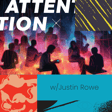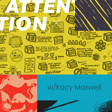Become a Creator today!Start creating today - Share your story with the world!
Start for free
00:00:00
00:00:01

Premise Based Channels (The Missing Ingredient To Your Channel)
In this epsidoe, Dan Sanchez shares one of his favorite content lessons he learned from Jay Acunzo that transformed how he approaches every content channel. It's what makes your content unique and it's the missing ingrediant you were looking for to make all of your channels remarkable.
Transcript
Introduction to Premise-Based Channels
00:00:04
Speaker
Welcome back to the Attention podcast. I'm Dan Sanchez with Sweetfish, and today I'm going to be talking about premise-based channels. Now, this is a concept that I learned from Jaya Kunzo just over a year ago, and I will tell you it has radically transformed the way I approach any new type of content channels, whether they be podcasts, social channels, YouTube channels, anything. It touches every content channel I work on now, and that is developing a premise for a channel.
00:00:34
Speaker
So certainly, this is going to be an overview of that topic and that concept.
Exploring 'Unthinkable' and Content Premises
00:00:38
Speaker
But if you want to go deeper, check out Jaya Kunzo's show called Unthinkable and his website at Jayakunzo.com, where you can get even a full course to open up the whole Schmorgas board of how to do this. I've taken the course. It was fantastic.
00:00:52
Speaker
but I wanted to tell you a little bit more about what it is. I'm actually recording this episode selfishly because I find myself explaining this concept over and over again. And I was like, you know what? I think I've just gotten to the point where I would need to do an episode on this just to save myself time and just to send it to people so that people can get educated on what it means to develop a premise for your show.
Challenges of Current Content Strategies
00:01:15
Speaker
So here's the thing. Here's the reason why this is even important, right?
00:01:19
Speaker
We all know that every company out there has a ton of social media and content channels out there. They got their blog, they got their Twitter handle, they got their LinkedIn page, their Facebook page, their Instagram account, their YouTube account, and almost every company has it, right? From small mom pop dentists all the way up to the big fortune 500 companies, but almost all of them
00:01:42
Speaker
don't have meaningful reach or engagement. What the heck? They all have it built into their marketing plan. They pay for a full-time social media manager to deal with these channels, and they're doing a lot of busy work to make the most of what they have, but they're not seeing the results they're hoping for.
00:02:03
Speaker
Think about how many pages you're engaging with on LinkedIn. How many companies? If you could think of a few, that's impressive. There's probably one, maybe two. But how many companies do you buy from? Probably lots. How many companies do you interact with? Brands. Even on the B to C space. And they do a lot better at this than most. How many do you interact with? Not a lot. You probably got a few. And if you count those few, they're probably whole consumer brands, right? Because they're a little bit better at this.
00:02:31
Speaker
But on the B2B side, there's a lot to be learned from here. And there is a trick. It's called treating your channels like a product. It's the thing that's missing from most channels.
Channels as Products with Unique Premises
00:02:43
Speaker
It's funny, we often approach a product and the product's marketing with a strong value proposition.
00:02:49
Speaker
A good technical word all of us marketers love. And if you're like me, I approach a value proposition as an answer to a question that your ideal buyer is going to be asking. And that question is, why should I buy from you versus your competitor or not buy at all? A good value proposition for a product has a good answer for that question.
00:03:09
Speaker
But I have to ask you the same thing when it comes to your channel. Let's take a look at your LinkedIn page, for example, your company LinkedIn page. Why should I subscribe to your company LinkedIn page or even want to see the content from it versus any of your competitors or not at all? Why?
00:03:27
Speaker
That is what a compelling premise also has an answer for. But it's not just a premise alone. So let's break down first. What is a premise? The simple answer is it's an angle. It's not the topic, but it's the way you approach the topic that's different than how anybody else is talking about that topic.
00:03:45
Speaker
So while you might be talking about marketing operations, your premise says you're approaching that topic differently. It's what makes it unique. Because while the topic might be appealing, the premise is what makes it valuable. Because it's what makes it different and differentiates it from all the other channels talking about the same old topic over and over again.
00:04:08
Speaker
And we've all seen these things out there. There's a reason why the show Hot Ones is so popular. He's the only show where all the guests are gonna eat from not-so-spicy chicken wings to incredibly hot, soul-melting chicken wings. And that's what makes his show interesting.
00:04:25
Speaker
It's an interesting gimmick he's made a premise around. Hot ones. Right? With intense questions. Morning Brew is another one with an interesting premise. And it's a really simple premise. When you think of reading Morning Brew, you think of reading it in the morning. Preferably with a cup of coffee. It's what you wake up to in the morning as you're caffeinating.
00:04:44
Speaker
Right? That's the premise behind it. Easy, consumable news in a newsletter over a cup of coffee. It's approachable. That's the premise.
Successful Content Premise Examples
00:04:53
Speaker
They picked a day part and they own that part of the day with their content. And then there's Noah Kagan. He's a great podcaster. He also has a YouTube channel. I actually like his podcast more than his YouTube channels. His podcast has a little bit more Noah in it.
00:05:07
Speaker
Now Noah's on a journey and that's the premise that ties the angle of his show is himself. He has places he's going to go and as he interviews very interesting people, mostly creators, he's often interjecting and reflecting on his own journey, taking what he learns from them and applying it and then referencing past episodes as he goes through the process of building his YouTube channel, which is very interesting to me as a marketer slash creator to watch somebody else far ahead of me developing a channel as they're walking through the thought process.
00:05:37
Speaker
of how to grow it behind the scenes.
Developing a Compelling Premise: Audience Insights
00:05:41
Speaker
So how do you build a compelling premise? Now there's a lot of work you can do that would absolutely make your premise much more, let's say, irresistible. But it has to do a lot with customer research, getting to know your audience, what their dying questions and needs and felt needs as well as unrecognized needs are.
00:06:00
Speaker
in order to develop, but we're not going to go into all of that because it's a lot to unpack. And there's a few simple twists you can do just to even take a normal topic channel and make it just a little bit better with a little bit of a premise. If you want to go the full stack, definitely go to jatkunzo.com, take the course, it's fantastic. But let's talk about a few ways you can just walk away from this episode and make your premise a little bit better.
00:06:25
Speaker
And while Jay Akunzo has seven different premises he used, there's two that I find to be the simplest to implement that gives you the most bang for your buck.
00:06:33
Speaker
One is the micro-day part, like with the morning brew, and the other one is called the journey, like I just mentioned with Noah. So let's circle back around to the micro-day part and what that can look like. The easiest thing you can do to make it interesting is to just pick a rhythm and build a lot more of your show around that rhythm, that part of the day or part of the week or maybe even part of the month. But generally, it's going to be a day of the week.
00:06:59
Speaker
or a time of the day. I once worked on a pitch, but I talked about inspiration in the evening because while most people work hard in their nine to five, we're going to talk about inspiration in the evening from five to nine in the evening or late hours of the day to talk about entrepreneurialism, right?
00:07:21
Speaker
It had this like evening news or late night thing going on where people were getting inspired to go and escape their normal nine to fives that they hate. And that's owning a day part of the evening. Another one I like to use as a recommendation or something to look at often is Whiteboard Friday. Rand Fishkin often ran a very popular video that came out around the topic of search engine optimization and then eventually many other topics in marketing.
00:07:47
Speaker
and it was just Whiteboard Friday. It could have been Whiteboard Monday, Whiteboard Tuesday. It was a fun and easy to consume video. I enjoyed watching it on Fridays. It was a great way to end the week and maybe that's why they chose it. Either way, I always knew when to expect that video and it was a great piece of content.
00:08:04
Speaker
but it made it a little bit more interesting by branding it around Friday and pulling in some of the elements of Friday into the show.
Simple Premises: Micro-Day Parts & Personal Journeys
00:08:12
Speaker
So whatever day part you do pick, just realize that you're picking up the feeling and emotions of that day or that part of the week. If it's Wednesday, it's overcoming the week. If it's Sunday, it might be relaxing. If it's Saturday, it might be going out and having an adventure. If it's Friday, it's the celebration that the week's over.
00:08:30
Speaker
If it's a Monday, then it's rise and grind, baby. So like everything has a different feeling and it brings extra emotion and interest to the topic that you're talking about. And you can apply that to any show. Now, the other one I want to talk about is the journey and that is taking and building
00:08:45
Speaker
an angle around the show with the host of the show. You'll notice that the attention podcast, that's the premise of the show, is my journey in building the audience of the show. Now, this show is just in the beginning, but I will be giving progress reports along the way to show people what's working, what's not working, what I thought was going to be a hit and what failed miserably. As I interview people, I'll be asking them selfishly for my own show, how to better grow it.
00:09:14
Speaker
So essentially, I'm a following in the footsteps of Noah, but I'm different than Noah. And I have my own story, my own reasons, and my own origin story that Noah does. Noah has a Silicon Valley origin story. I have a very different backstory. And that will shine through in later episodes.
00:09:31
Speaker
But the unifying thread is the host and what the host is trying to figure out or the journey that the host is on to solve X. For this show, it's to figure out what it takes to grow an audience because everybody wants to grow one and the leverage is all there too that makes it worth growing. But it's not exactly clear how. And that's what I'm unpacking in this show.
00:09:55
Speaker
So hopefully learning a little bit more about how a premise can really impact your content has helped you learn how to grow your own channels a little bit better today. And stay tuned for the next episode where I'm going to be talking about not just how to grow an audience, but to grow community and how those two things are different.
















